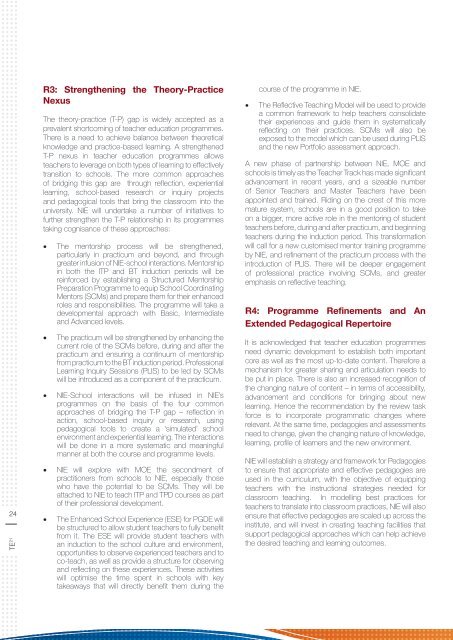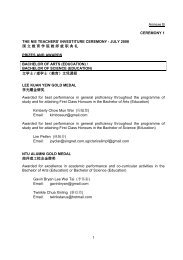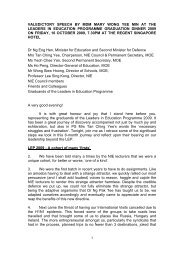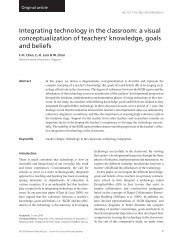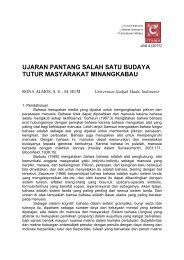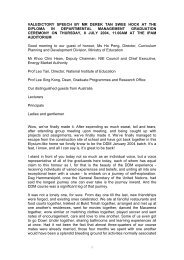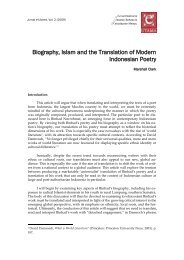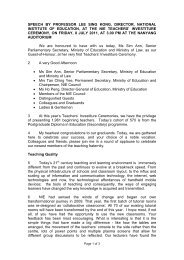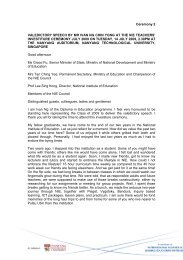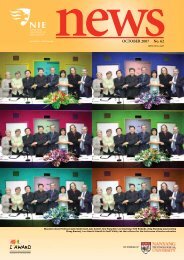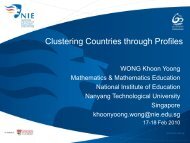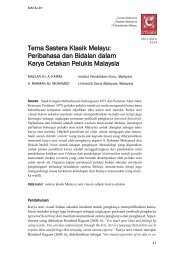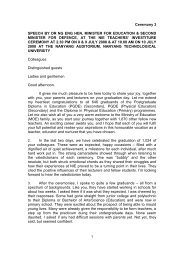A Teacher Education Model for the 21 Century - National Institute of ...
A Teacher Education Model for the 21 Century - National Institute of ...
A Teacher Education Model for the 21 Century - National Institute of ...
You also want an ePaper? Increase the reach of your titles
YUMPU automatically turns print PDFs into web optimized ePapers that Google loves.
24<br />
24<br />
24<br />
TE <strong>21</strong><br />
R3: Streng<strong>the</strong>ning <strong>the</strong> Theory-Practice<br />
Nexus<br />
The <strong>the</strong>ory-practice (T-P) gap is widely accepted as a<br />
prevalent shortcoming <strong>of</strong> teacher education programmes.<br />
There is a need to achieve balance between <strong>the</strong>oretical<br />
knowledge and practice-based learning. A streng<strong>the</strong>ned<br />
T-P nexus in teacher education programmes allows<br />
teachers to leverage on both types <strong>of</strong> learning to effectively<br />
transition to schools. The more common approaches<br />
<strong>of</strong> bridging this gap are through reflection, experiential<br />
learning, school-based research or inquiry projects<br />
and pedagogical tools that bring <strong>the</strong> classroom into <strong>the</strong><br />
university. NIE will undertake a number <strong>of</strong> initiatives to<br />
fur<strong>the</strong>r streng<strong>the</strong>n <strong>the</strong> T-P relationship in its programmes<br />
taking cognisance <strong>of</strong> <strong>the</strong>se approaches:<br />
• The mentorship process will be streng<strong>the</strong>ned,<br />
particularly in practicum and beyond, and through<br />
greater infusion <strong>of</strong> NIE-school interactions. Mentorship<br />
in both <strong>the</strong> ITP and BT induction periods will be<br />
rein<strong>for</strong>ced by establishing a Structured Mentorship<br />
Preparation Programme to equip School Coordinating<br />
Mentors (SCMs) and prepare <strong>the</strong>m <strong>for</strong> <strong>the</strong>ir enhanced<br />
roles and responsibilities. The programme will take a<br />
developmental approach with Basic, Intermediate<br />
and Advanced levels.<br />
• The practicum will be streng<strong>the</strong>ned by enhancing <strong>the</strong><br />
current role <strong>of</strong> <strong>the</strong> SCMs be<strong>for</strong>e, during and after <strong>the</strong><br />
practicum and ensuring a continuum <strong>of</strong> mentorship<br />
from practicum to <strong>the</strong> BT induction period. Pr<strong>of</strong>essional<br />
Learning Inquiry Sessions (PLIS) to be led by SCMs<br />
will be introduced as a component <strong>of</strong> <strong>the</strong> practicum.<br />
• NIE-School interactions will be infused in NIE’s<br />
programmes on <strong>the</strong> basis <strong>of</strong> <strong>the</strong> four common<br />
approaches <strong>of</strong> bridging <strong>the</strong> T-P gap – reflection in<br />
action, school-based inquiry or research, using<br />
pedagogical tools to create a ‘simulated’ school<br />
environment and experiential learning. The interactions<br />
will be done in a more systematic and meaningful<br />
manner at both <strong>the</strong> course and programme levels.<br />
• NIE will explore with MOE <strong>the</strong> secondment <strong>of</strong><br />
practitioners from schools to NIE, especially those<br />
who have <strong>the</strong> potential to be SCMs. They will be<br />
attached to NIE to teach ITP and TPD courses as part<br />
<strong>of</strong> <strong>the</strong>ir pr<strong>of</strong>essional development.<br />
• The Enhanced School Experience (ESE) <strong>for</strong> PGDE will<br />
be structured to allow student teachers to fully benefit<br />
from it. The ESE will provide student teachers with<br />
an induction to <strong>the</strong> school culture and environment,<br />
opportunities to observe experienced teachers and to<br />
co-teach, as well as provide a structure <strong>for</strong> observing<br />
and reflecting on <strong>the</strong>se experiences. These activities<br />
will optimise <strong>the</strong> time spent in schools with key<br />
takeaways that will directly benefit <strong>the</strong>m during <strong>the</strong><br />
course <strong>of</strong> <strong>the</strong> programme in NIE.<br />
• The Reflective Teaching <strong>Model</strong> will be used to provide<br />
a common framework to help teachers consolidate<br />
<strong>the</strong>ir experiences and guide <strong>the</strong>m in systematically<br />
reflecting on <strong>the</strong>ir practices. SCMs will also be<br />
exposed to <strong>the</strong> model which can be used during PLIS<br />
and <strong>the</strong> new Portfolio assessment approach.<br />
A new phase <strong>of</strong> partnership between NIE, MOE and<br />
schools is timely as <strong>the</strong> <strong>Teacher</strong> Track has made significant<br />
advancement in recent years, and a sizeable number<br />
<strong>of</strong> Senior <strong>Teacher</strong>s and Master <strong>Teacher</strong>s have been<br />
appointed and trained. Riding on <strong>the</strong> crest <strong>of</strong> this more<br />
mature system, schools are in a good position to take<br />
on a bigger, more active role in <strong>the</strong> mentoring <strong>of</strong> student<br />
teachers be<strong>for</strong>e, during and after practicum, and beginning<br />
teachers during <strong>the</strong> induction period. This trans<strong>for</strong>mation<br />
will call <strong>for</strong> a new customised mentor training programme<br />
by NIE, and refinement <strong>of</strong> <strong>the</strong> practicum process with <strong>the</strong><br />
introduction <strong>of</strong> PLIS. There will be deeper engagement<br />
<strong>of</strong> pr<strong>of</strong>essional practice involving SCMs, and greater<br />
emphasis on reflective teaching.<br />
R4: Programme Refinements and An<br />
Extended Pedagogical Repertoire<br />
It is acknowledged that teacher education programmes<br />
need dynamic development to establish both important<br />
core as well as <strong>the</strong> most up-to-date content. There<strong>for</strong>e a<br />
mechanism <strong>for</strong> greater sharing and articulation needs to<br />
be put in place. There is also an increased recognition <strong>of</strong><br />
<strong>the</strong> changing nature <strong>of</strong> content – in terms <strong>of</strong> accessibility,<br />
advancement and conditions <strong>for</strong> bringing about new<br />
learning. Hence <strong>the</strong> recommendation by <strong>the</strong> review task<br />
<strong>for</strong>ce is to incorporate programmatic changes where<br />
relevant. At <strong>the</strong> same time, pedagogies and assessments<br />
need to change, given <strong>the</strong> changing nature <strong>of</strong> knowledge,<br />
learning, pr<strong>of</strong>ile <strong>of</strong> learners and <strong>the</strong> new environment.<br />
NIE will establish a strategy and framework <strong>for</strong> Pedagogies<br />
to ensure that appropriate and effective pedagogies are<br />
used in <strong>the</strong> curriculum, with <strong>the</strong> objective <strong>of</strong> equipping<br />
teachers with <strong>the</strong> instructional strategies needed <strong>for</strong><br />
classroom teaching. In modelling best practices <strong>for</strong><br />
teachers to translate into classroom practices, NIE will also<br />
ensure that effective pedagogies are scaled up across <strong>the</strong><br />
institute, and will invest in creating teaching facilities that<br />
support pedagogical approaches which can help achieve<br />
<strong>the</strong> desired teaching and learning outcomes.


